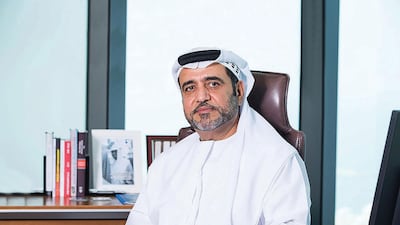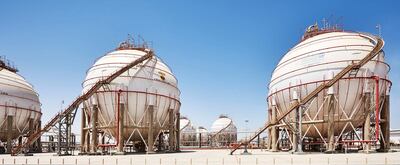The Abu Dhabi National Oil Company is optimistic about the long-term prospects of the global petrochemicals industry and demand for plastics, particularly in health care as it hastens the development of a chemicals hub in Ruwais.
The UAE is banking on the long-term viability of the sector to support its economic diversification at a time that international oil companies are selling their chemical assets to maintain profitability.
"We will continue to be focusing on the long-term rather than be [affected] by the short-term cyclical nature of our business," Adnoc downstream executive director Abdulaziz Alhajri told The National.
He was speaking after Adnoc agreed to form a joint venture with Abu Dhabi holding company ADQ to support chemical manufacturing projects at the industrial hub at Ruwais, in the emirate's Al Dhafra region.
"Petrochemicals are going to grow. No doubt about it,” said Mr Alhajri.
The pandemic has provided the state oil company with a unique opportunity to adapt to growing demand for health materials and packaging.
“Materials that go into health goods – masks and gloves and all of these – showed growth and high demand during this pandemic,” said Mr Alhajri.
The company was able to shift production from one application to another using specialised technology and respond to the market.
“In the future, this is what is very important integration – an integrated approach all the way from, you know, refining and even upstream, from crude production all the way down to the customer, including the supply chain."
The venture with ADQ is intended to create a platform to attract foreign direct investment into manufacturing clusters that grow in parallel with the expansion of Adnoc’s refinery and petrochemical plants.
A derivatives park in Ruwais, which is expected to be completed in 2025, will operate on the basis of a “plug and play” concept.
“That means we will create an ecosystem – all the utilities, the services, will take advantage of the mega infrastructure that we have in Ruwais and the derivatives park tenants or investors will come in and they find all of this available to them,” said Mr Alhajri.
ADQ – whose portfolio of assets includes non-oil sector companies such as Abu Dhabi Ports, Etihad Rail, Emirates Steel and Taqa – will "improve the confidence of the investors,” said Mr Alhajri, who sees various synergies from the joint venture.
"The parks will require utilities and will require rail transportation and logistics – all of these companies are under the portfolio of ADQ,” he said.
“There is both direct and indirect to benefit to ADQ and to all the sectors of the economy and the aim is to attract foreign direct investment and technologies and to the country.”
The development of the derivatives park at Ruwais was first announced in May 2018 when Adnoc said it was looking to invest $45bn alongside partners to capture more value from its crude production.
Ruwais has been earmarked for a multibillion dollar expansion from its current refining capacity of 922,000 barrels per day, which is already the world’s fourth-largest, to 1.5 million bpd by 2025, making it the largest such facility in the world.
The UAE, which accounts for about 4 per cent of global oil production, much of it from onshore and offshore Abu Dhabi fields operated by Adnoc, is looking to meet the demand for products, largely in Asia.
Output from the chemicals industry in the UAE, which is almost entirely operated by the Adnoc-Borealis joint venture Borouge, is also expected to expand from the current 4.5 million tonnes a year to 14.4 million tonnes a year by 2025.
Plans are under way to build the world’s largest mixed-feed cracker and a 1.6 million tonne capacity plant for the manufacture of aromatics.
The mixed-feed cracker project in Ruwais, which is part of the Borouge 4 scheme, "is well into [the] front-end engineering design”, with construction expected to begin by the end of next year, Mr Alhajri said.
The feedstock from this expansion was earmarked to flow into clusters around the refining and chemicals hub, with international companies and local partners set to develop derivatives to support various industries.
Adnoc has surveyed over 200 products that can be manufactured at the Ruwais hub. A shortlist of 25 products, which will be developed from available feedstock, will be announced in the coming weeks.
Companies that look to develop products at Ruwais will be allowed 100 per cent ownership, said Mr Alhajri, or they could avail of joint investment opportunities with Adnoc and ADQ.
The derivatives park has already attracted big names. Spanish energy company Cepsa, a world leader in the production of linear alkyl benzene, a compound used by the detergents industry, is developing a 150,000-tonne project in Ruwais.
The plant will tap the feedstock of kerosene and benzene from the refinery to manufacture surfactants – detergents, emulsifiers and foaming and wetting agents.



